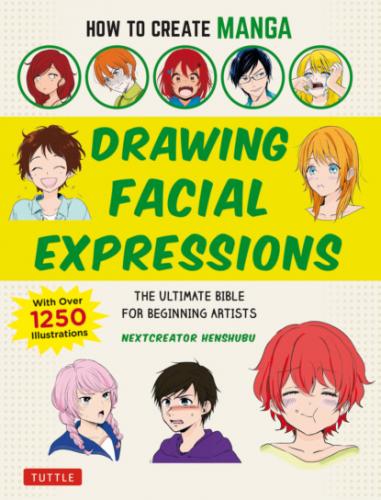How to Create Manga: Drawing Facial Expressions. NextCreator Henshubu
138
Why We Wrote This Book
When drawing illustrations or manga, facial expressions are key to conveying the characters’
thoughts and emotions. In this book, we cover a wide range of facial expressions, starting
with the basics such as smiling or getting angry but also looking at those that are a
combination of various emotions. Each expression is categorized according to the general
emotion it conveys, making it easy to find the one you’re looking for.
However, there are countless ways to express emotions; there’s more than one facial
expression for each emotion. For instance, a simple “smile” could mean smiling through
tears, smiling even when something is not funny, or other smiles that differ depending
on their accompanying emotions. Many different emotions mix and are revealed via the
4
face’s varied expressions. It could be said that even if drawing the same “smiling face,” 10
different characters will wear 10 different smiles, with various techniques making it possible
to change the expression completely. For that reason, there are more than 870 illustrations
as examples in this book, with accompanying comments to clearly explain areas to focus on
and to provide you with ideas for the various appealing aspects and ways of thinking about
each expression.
We hope you’ll use the book in a variety of ways, copying the facial expressions that you
like and reading the whole volume to find hints to help you draw them. We hope this book
helps you bring previously untapped emotion to your characters.
—The Artists of NextCreator
(see pages 174–175 for
information about them)
5
How to Use This Book
Structure of the Book
PART 1 Basic Expressions
Here, we cover the six basic expressions of joy, anger, sadness, surprise, dislike and fear. The degrees
of emotion and the characteristics of each expression are summarized in this section.
PART 2 Facial Expressions That Add Color and Detail
Here, we analyze the facial expressions used in scenes of romance, eating/drinking and resting. They
are divided into scenes or situations that make it easier to visualize their use, along with many other
expressions that can be incorporated into other types of scenes.
PART 3 Animated Expressions
Making use of language to evoke images, the expressions in this section are divided into positive and
negative. Be aware, however, that some of the illustrated examples may bear both nuances.
Various Types of Page Layout
Basic Expressions pages:
These pages introduce the basic expressions of joy, anger, sadness,
surprise, dislike and fear.
6
Other Expressions pages:
Various expressions explained via multiple illustrated examples.
7
DISCUSSION
Blue arrows
These indicate the direction of movement
of the body part or body as a whole.
Discussions
Analyses of ideas related to the facial expression,
how to use the paint tool and so on.
Orange arrows
These indicate where the emotion is
heading and the degree of emotion.
EXPERT TIPS
Expert tips
These cover emotional expressions using parts
of the body other than the face as well as how to
use symbolic expression to convey emotions.
Symbolic expression and distortion
Symbolic expression is a method of representation used in manga and cartoons. In
this book, it refers to the stylized symbols often used in manga, such as the symbol for
anger, the droplets that denote sweat from panic and the symbol for blood draining
from the face (see below). It’s easiest to think of them in the same way as the emoji on
your smartphone.
Caricaturizing or distortion is the technique of expressing something in a simplified or
exaggerated way. In this book, it refers to overlarge eyes, mouths that protrude from the
face and other such exaggeration.
Examples of symbolic expressions
Blush
This expression
reddens the face and
expresses shyness,
excitement, etc.
Anger
Captures the veins
that protrude
from the forehead
